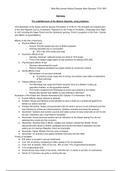Mike MacLennan-History Example Note-Germany 1918-1945
Germany
The establishment of the Weimar Republic- early problems:
[The abdication of the Kaiser and the German Revolution of 1918-19. The strengths and weaknesses
of the new Republic and its Constitution. Reactions to the Treaty of Versailles. Challenges from Right
to Left, including the Kapp Putsch and the Spartacist uprising. French occupation of the Ruhr. Causes
and effects of hyperinflation.]
Effects of the War of Germany
● Physical effects of war
○ Around 750,000 people died due to British blockade
○ Farming disrupted due to conscription
■ 50% mile, 60% butter and meat
● Economic effects of war
○ Germany bankrupt; national income at a third of 1913 levels
○ Third of the states budget spent on war pensions for widows (600,000)
● Psychological effects of war
○ Germans demoralised by result
○ Political infighting developed as people looked for someone to blame
● Social effects of war
○ Rift between rich and poor widened
■ E.g factory owner made lots of money, but workers were bitter at restrictions
of their earnings
● Political effects of war
○ The Reichstag was weak and Kaiser became more of a dictator, locking up
opposition leaders, as the opposition started
○ This further weakened the Reichstag as power was centred on the Kaiser
○ People also blamed their defeat on new politicians, like Ebert
Abdication of the Kaiser and German Revolution(25th October-11th November 1918)
● Events/ Effects: Kaiser refused to abdicate
● October- Naval commanders at Kiel decided to send in ships as a suicide bid against the
British but sailors mutinied
● October-November- Kaiser and government did not send in army to crush mutineers and this
was followed by strikes and demonstrations. Soldiers mutinied and joined the protests
● November- Soldiers and workers councils and taken control of many cities with an aim to end
the war. Politicians see a real threat of revolution
● November- Social democrat leaders sent an ultimatum to the Kaiser saying if he did not
abdicate they would join the revolution
● November- General strike in Berlin, soldiers and workers roamed the streets. Social
democrats were afraid so Eberts colleagues announced the Kaiser's abdication and the
setting up of a German Republic- Ebert as Chancellor
● November- Kaiser Wilhelm fled into exile in Holland
● November- An armistice was agreed between Germany and the Allies
Treaty of Versailles
● $33 billion to be paid in annual instalments
● Lost 13% of territory containing 6 million people (12% of population)
● Took 10% of industry- 48% of iron ore, 16% of coal, 15% of agricultural production
● 15% of agricultural land
● Armed forces were made to low levels- 100,000 men, no tanks or aircraft, no submarines
● Article 231 Germany are guilty or starting the war
, Mike MacLennan-History Example Note-Germany 1918-1945
Problems facing Germany 1918
● food shortages (million tons)
○ Potatoes 1912- 52.0/ 1918- 26.4
○ Rye 1912- 11.9/ 1918- 7.2
○ Oats 1912- 9.1/ 1918- 4.3
○ Wheat 1912- 4.9/ 1918- 2.5
○ Barley 1912- 3.6/ 1918- 2.1
● Industriel production was about ⅔ of what it had been in 1913
● War left 600,000 widows and 2 million children without fathers
● Coal ran out, electric light turned off and gas power turned down
Spartacist Uprising (January 1919)
○ Causes
● An extreme left wing group called the Spartacists, who were communists, wanted to
overthrow the Weimar Republic and create a Communist Government.
○ Events/ Effects:
● 5th January 1919- Spartacists captured the headquarters of the government's Newspaper
headquarters and Government bureau, but they failed to capture any other buildings and the
whole uprising was badly prepared and unsuccessful. The uprising was easily crushed by the
Freikorps
● 10th January- they took over the Spartacist headquarters
● 15th January- The Spartacists were crushed and 100 were killed to only 14 Freikorps
● Separatist leaders Rosa Luxemburg and Karl Liebknecht were caught and murdered. The
murder of their leaders crushed the uprising. Freikorps also put down several other
Communist rising in 1919 as well
Kapp Putsch (March 1920)
○ Causes
● Germans hated the Treaty of Versailles, the army posed the greatest threat. The army hated
the restrictions placed on them and blamed the government. Many soldiers who were part of
the reduction joined the Freikorps
● The Allies sawa threat from the size of the unofficial forces so ordered the government to
disband them. When they tried, The Freikorps, led by Wolfgang Kapp, marched into Berlin
and declared a new national government
● So the politicians appealed to the people who went on a general strike that was so successful
that the PUTSCh collapsed within days as public services ground to a halt
○ Events/ Effects
● March 1920- Freikorps led by Wolfgang Kapp marched into Berlin and declared a new
national government. The army did not stop them
● March- The politicians appealed to the workers to help them who went on a general strike
which collapsed the putsch within days
French and Belgium Invasion of the Ruhr (1923-25)
○ Causes
● Germany did not keep its reparation payments. In response the French and Belgium invaded
the Ruhr to seize the raw materials, Germany's most important industrial regions, so Germany
chose to go on strike so France could not take the coal that Germany owed
○ Events/ Effects
● 1923=> Germany was now losing all of the economic gain from there industrial heartland.
Passive resistance was making germany even poorer
● Germany's response was to print more money to pay reparations, but this Germany into a
period of hyperinflation, where in at the end of 1923, on US dollar was equivalent to 4.2 trillion
German marks.
, Mike MacLennan-History Example Note-Germany 1918-1945
Hyperinflation (1923
○ Causes
● The government could not pay off its debts party due to the passive resistance in the Ruhr so
they began to print more money
● Reparations accounted for 1/3rd of Germans deficit
○ Events/ Effects
● Pensioners and savings lost all value as people who had worked there entire lives became
beggars and lost all their savings.
● July 1922……… 1
● January 1923……… 27.85
● July 1923……… 1,940
● November 1923……… 72,600,000,000
● Therefore people stop working because money is worth nothing
● People trade instead of paying people due to the lack of worth money have
● People blamed the Weimar Republic who had agreed to pay reparations in the first place





